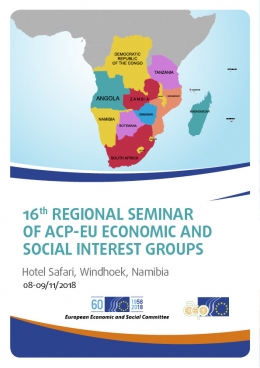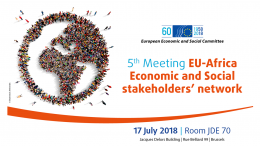European Economic
and Social Committee
L-AKP u l-Afrika
Mill-ewwel Konvenzjoni ta’ Lomé (1975) sal-Ftehim ta’ Cotonou (2000-2021), is-Sħubiji AKP-UE rregolaw ir-relazzjonijiet bejn l-UE u 79 pajjiż mill-Grupp ta' Stati Afrikani, tal-Karibew u tal-Paċifiku (AKP), li dan l-aħħar sar l-Organizzazzjoni tal-Istai Afrikani, tal-Karibew u tal-Paċifiku (OACPS).
Matul dan il-perjodu, il-KESE flimkien mas-soċjetà ċivili tal-AKP ġġieldu għar-rikonoxximent tar-rwol essenzjali tal-operaturi mhux statali fil-proċess ta’ żvilupp sakemm dan inkiseb fil-Ftehim ta’ Cotonou, li ta mandat lill-KESE biex jorganizza attivitajiet u konsultazzjonijiet ma’ gruppi ta’ interess ekonomiku u soċjali tal-AKP u l-UE bil-għan li jinġabru l-fehmiet tas-soċjetà ċivili organizzata u biex din tingħata leħen. L-għan kien li jiġu promossi l-iskambji u jitressqu rakkomandazzjonijiet dwar kwistjonijiet u politiki relatati mar-relazzjonijiet tal-AKP-UE, li mbagħad jiġu indirizzati mill-mexxejja tal-UE u tal-AKP.
F'termini prattiċi, l-attivitajiet tal-KESE dwar ir-relazzjonijiet bejn l-UE u l-OACPS jitwettqu prinċipalment taħt il-gwida tal-Kumitat ta’ Segwitu UE-AKP, magħmul minn membri tal-KESE u delegati li jirrappreżentaw lill-gruppi ta’ interess ekonomiku u soċjali mill-AKP.
Il-Kumitat ta’ Segwitu UE-AKP jżomm kuntatti regolari mar-rappreżentanti tas-soċjetà ċivili fil-pajjiżi AKP f’diversi livelli, permezz ta’ dawn li ġejjin:
- laqgħat regolari tal-Kumitat ta’ Segwitu UE-AKP;
- Seminars Reġjonali fil-pajjiżi AKP, li jipprovdu forum għad-diskussjoni ta’ suġġetti ta’ interess komuni mar-rappreżentanti tas-soċjetà ċivili li jalternaw bejn reġjuni differenti,
- Laqgħat Ġenerali triennali bejn gruppi ta’ interess ekonomiku u soċjali mill-AKP u l-UE fi Brussell.
Il-KESE jżomm ukoll kuntatti regolari mar-rappreżentanti tal-gruppi ta' interess ekonomiku u soċjali tal-Unjoni Afrikana fil-qafas tal-Istrateġija Konġunta Afrika-UE. B'mod partikolari, il-KESE jorganizza laqgħat annwali man-Network tal-Partijiet Interessati Ekonomiċi u Soċjali UE-Afrika.
Il-KESE ilu snin twal iżomm kuntatt regolari mal-Assemblea Parlamentari Konġunta AKP-UE billi jippreżenta rapport dwar l-attivitajiet tiegħu fis-sessjonijiet tal-Assemblea Plenarja.
Bl-istess mod, il-KESE jinsab f’kuntatt mill-qrib ma’ organizzazzjonijiet internazzjonali ta’ min iħaddem, il-ħaddiema, il-bdiewa, il-kooperattivi u l-konsumaturi. Dawn l-organizzazzjonijiet jinnominaw ir-rappreżentanti tal-AKP li jiġu mistiedna għal-laqgħat tal-KESE, inkluż il-Kumitat ta’ Segwitu UE-AKP.








